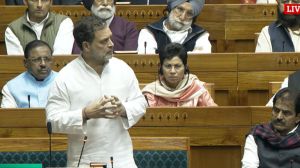Setback for Cong, Left as SC scraps Assam migrants law
By striking down an Assam-specific law that has been in force for over 20 years, the Supreme Court today put a question mark over lakhs of M...

By striking down an Assam-specific law that has been in force for over 20 years, the Supreme Court today put a question mark over lakhs of Muslims who could be suspected to have illegally migrated from Bangladesh since 1971.
The scrapping of the Illegal Migrants (Determination by Tribunals) Act 1983 has also come as a political bombshell in the run-up to the Assembly elections next year in the two big states bordering Bangladesh, Assam and West Bengal.
The apex court declared the IMDT Act ‘‘unconstitutional’’ despite the endorsement of that law by the current regimes at the Centre and in the states of Assam and West Bengal.
In fact, the UPA Government at the Centre and the Congress Government of Assam had reversed the positions taken in the matter by their predecessors, the NDA and AGP Governments, respectively.
The Left Front Governmnt in West Bengal had on its part intervened in favour of the IMDT Act even though the law was confined to Assam.
Not surprisingly, today’s judgment evoked a guarded response from the Congress and Left while the BJP and VHP celebrated it as a vindication of their long-standing campaign against Bangladeshi migrants.
A three-judge bench headed by Chief Justice of India R C Lahoti unanimously struck down the IMDT Act on a petition filed by AGP leader Sarbananda Sonowal.
|
So what happens now to
the Bangladeshi migrants in Assam |
||
|
• Under IMDT Act, 1983: n All Bangladeshis who moved to Assam before March 1971 are citizens. |
||
As a result, the more stringent migration law applicable to the rest of the country, Foreigners Act 1946, will apply once again to Assam after a lapse of two decades.
Further, the 2.5 lakh cases said to be pending before the 16 tribunals set up under the IMDT Act will now be transferred to tribunals that will be set up in Assam the Foreigners Act.
The Indira Gandhi Government had specially enacted the IMDT law at the height of the Assam agitation, adapting its provisions to the peculiar demography of the state adjoining Bangladesh. Besides laying down a cumbersome procedure, the IMDT Act shifted the burden of proof from the accused to the complainant.
The Supreme Court today upheld Sonowal’s petition filed in 2000 contending that the provisions of the IMDT Act were ‘‘arbitrary and unreasonable’’ as the liberal procedure laid down by it defeated the stated object of expediting the detection and deportation of illegal migrants.
Sonowal had also alleged that the IMDT Act was only encouraging vote bank politics without making a dent on the growing problem of illegal migrants in Assam. In all these years, the tribunals are said to have deported less than 2,000 migrants.
Deploring the failure of the IMDT Act to roll back the rampant problem of illegal migration, the apex court directed the Assam government to constitute sufficient number of tribunals under the Foreigners Act to deal with the situation.
The court was evidently not satisfied with the Tarun Gogoi Government’s undertaking to make the tribunals of the IMDT Act more effective.
The judgment flies in the face of the announcement made by Dr Manmohan Singh in his last visit to Assam, his adoptive state, that the IMDT Act would not be repealed. Ironically, Dr Manmohan Singh’s statement was meant to dispel the speculation that the UPA Government might revive the Bill introduced by the NDA Government to repeal the IMDT Act.
- 01
- 02
- 03
- 04
- 05































